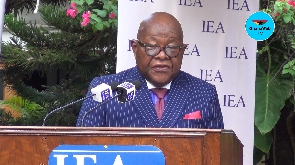 Former Speaker of Parliament, Prof. Aaron Mike Oquaye
Former Speaker of Parliament, Prof. Aaron Mike Oquaye
Former Speaker of Parliament, Prof. Aaron Mike Oquaye, has issued a stark warning that Ghana may be forced to seek relief from the International Monetary Fund (IMF) within the next six years if the nation fails to tackle its import dependency and inefficient utilization of mineral resources.
Speaking at the 2nd R.S. Blay Memorial lectures, Prof. Oquaye stressed the need for a thorough examination of Ghana's approach to harnessing its natural resources.
Drawing attention to the recent Ukraine-Russia war and its global economic impact, Prof. Oquaye highlighted the significance of geopolitical events on Ghana's economic stability. He expressed deep concern that without immediate action to reduce import dependency and maximize the utilization of mineral resources, Ghana will remain vulnerable to IMF intervention.
"We must re-examine our natural resources. We should aim to be less import dependent. If we rely on Ukraine's wheat for our bread, we will suffer. Unfortunately, that is the reality of our nation today. Every day, we flock to the ports in Tema or Takoradi to obtain clothing and food. Import dependency must be addressed starting today, or we will continue to rely on the IMF every six years."
"Now we are seeking IMF assistance for the 17th time. What would great individuals like R.S. Blay think about Ghana beyond the 17th time seeking IMF support? We need a new approach to national orientation. What is happening to our gold, diamond, and bauxite? Are we maximizing the use of our oil? What are the terms of our oil contracts? Who is responsible for approving these contracts?"
Prof. Oquaye further called for expert inquiries into the allocation of public lands for the exploitation of Ghana's resources, including gold and petroleum.
"There should be a provision for public inquiries at the local level, similar to what exists in England. Before we exploit Ghana's oil, regardless of which political party is in power, a technocratic oil commission with experts who understand the business should provide their advanced assessments. We need these checks and balances in our legal and constitutional framework, as suggested by individuals like Justice R.S. Blay."
He emphasized the necessity of establishing a National Development Planning Institution to achieve sustained national development with a neutral membership in the National Development Planning Commission.
"It cannot be overstated that a National Development Planning Institution is crucial for our country. The current pendulum-like state of development, where new policies and projects are introduced by governments only to be abandoned when they leave office, is tragic. Article 35(7) provides that governments shall continue and execute projects and programs commenced by previous administrations as far as practicable."
"However, the politicization of the NDPC and the abandonment of projects initiated by previous governments greatly harm our nation. We must address this challenge and propose remedies," Prof. Oquaye emphasized.
YNA/KPE